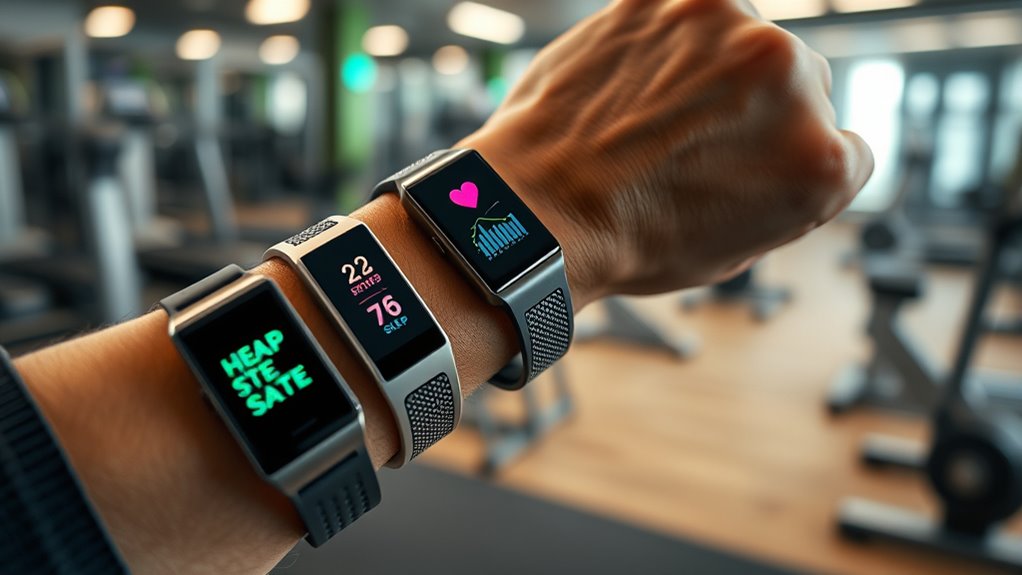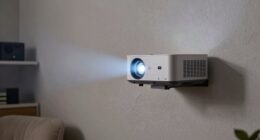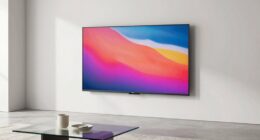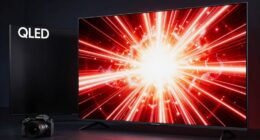Fitness trackers and wearables are great tools for monitoring your sleep patterns, heart rate variability, and overall wellness. They automatically detect sleep cycles, track HRV, and provide insights to help you improve habits like sleep hygiene and stress management. With real-time feedback and trend analysis, these devices empower you to make healthier choices daily. Keep going to discover how integrating these features can elevate your health journey even further.
Key Takeaways
- Fitness trackers monitor sleep cycles, quality, and patterns to improve sleep hygiene and overall health.
- They measure heart rate variability (HRV) to assess stress levels and recovery status.
- Wearables promote healthier habits by providing real-time feedback and lifestyle recommendations.
- Automatic data recognition enables continuous, precise monitoring without manual input.
- These devices support proactive wellness management through trend analysis and integration with other health metrics.

In today’s health-conscious world, fitness trackers and wearables have become essential tools for monitoring your well-being. These devices do more than just count steps—they provide valuable insights into your sleep quality and heart rate variability, helping you understand your body better. When you wear a fitness tracker overnight, it tracks your sleep cycles, including light, deep, and REM sleep stages. You can see how restful your sleep truly is and identify patterns that might affect your overall health. Good sleep is crucial, and these devices make it easier to pinpoint issues like frequent awakenings or insufficient rest, so you can make adjustments to improve your sleep hygiene.
Fitness trackers monitor sleep cycles and help improve sleep quality for better overall health.
Heart rate variability (HRV) is another important metric these devices monitor. HRV measures the variation in time between your heartbeats, offering a window into your autonomic nervous system’s health. A high HRV generally indicates a well-recovered, resilient body, while a low HRV could signal stress, fatigue, or overtraining. By tracking HRV daily, you gain insights into how your lifestyle impacts your stress levels and recovery. For athletes or anyone aiming to maximize performance, understanding HRV helps determine the best times to push harder or rest, preventing overexertion and reducing injury risk. Wearables often sync with smartphone apps, providing visual graphs and trends so you can see how your heart rate variability fluctuates over days or weeks.
These devices also actively promote healthier habits. When they detect poor sleep quality or declining HRV, they may suggest lifestyle changes, such as adjusting your bedtime, managing stress, or incorporating relaxation techniques. Some wearables even integrate with other health metrics like activity levels and calorie intake, giving you a complete picture of your health status. The convenience of real-time feedback motivates you to stay consistent with sleep routines and stress management practices, which are essential for maintaining ideal health.
Furthermore, many fitness trackers automatically recognize when you’re sleeping or exercising, eliminating the need for manual input. They use advanced sensors and algorithms to analyze your data accurately. With continuous monitoring, you can identify subtle changes in your sleep patterns or HRV that might otherwise go unnoticed. Over time, this information helps you fine-tune your daily habits, leading to better sleep quality and a more balanced autonomic nervous system. Additionally, understanding mindfulness practices can further support stress reduction and overall well-being, complementing the data collected by your device. By staying informed about these critical signs, you’re empowered to take proactive steps towards improved health and resilience, making wearables an indispensable part of your wellness journey.
Frequently Asked Questions
How Accurate Are Fitness Trackers in Measuring Calorie Intake?
Fitness trackers aren’t highly accurate for measuring calorie intake because they mainly focus on activity and heart rate, not precise calorie counting. While they can help with nutritional tracking by logging foods and estimating calories, you should take these numbers with a grain of salt. For better accuracy, double-check portion sizes and use detailed food logs, but remember, these devices give you a good general idea, not exact figures.
Can Wearables Detect Early Signs of Health Issues?
Think of wearables as vigilant sentinels, quietly watching over your health. They can indeed detect early signs of health issues through continuous symptom monitoring and essential sign tracking. By alerting you to irregular heartbeats, abnormal blood pressure, or sleep disturbances, they enable early detection, giving you a chance to seek medical advice before problems escalate. These devices serve as your proactive health allies, catching warning signals before they become critical.
Are Fitness Trackers Suitable for Children and Seniors?
Yes, fitness trackers can be suitable for children and seniors if designed with child safety and senior health in mind. You should look for devices with easy-to-use features, GPS tracking for safety, and health monitoring functions tailored to their needs. For children, prioritize safety features like secure data sharing. For seniors, choose trackers that promote mobility and monitor essential signs, helping you support their well-being effectively.
How Do Wearables Protect User Data and Privacy?
Wearables protect your data by using data encryption, ensuring your information stays secure during transmission and storage. They also follow strict privacy policies that specify how your data is collected, used, and shared, giving you control over your personal information. Always review these policies to understand your rights. By prioritizing encryption and transparency, wearables aim to safeguard your privacy while helping you stay healthy.
What Features Should I Look for in a Fitness Tracker?
You should look for a fitness tracker with accurate heart rate monitoring and sleep tracking features. Make certain it offers real-time data, customizable goals, and easy syncing with your devices. Water resistance is useful if you swim or sweat a lot. Additionally, check for long battery life and user-friendly apps to track your progress. These features help you stay motivated and gain insights into your overall health.
Conclusion
So, you’ve got your sleek fitness tracker ready to save your health—yet, somehow, it still can’t tell you when you’ve overindulged or remind you to breathe. Ironically, these gadgets promise better health, but they often highlight just how little control we actually have. Maybe, instead of obsessing over data, you should just go for a walk or, I don’t know, enjoy a donut—your device probably won’t alert you to that either.









